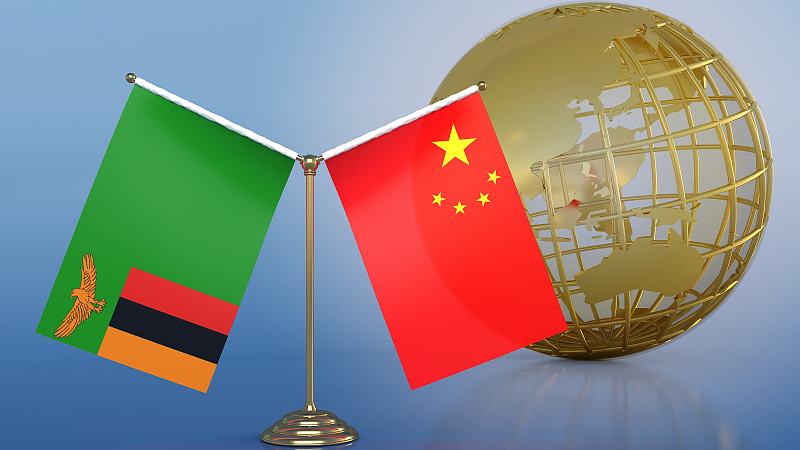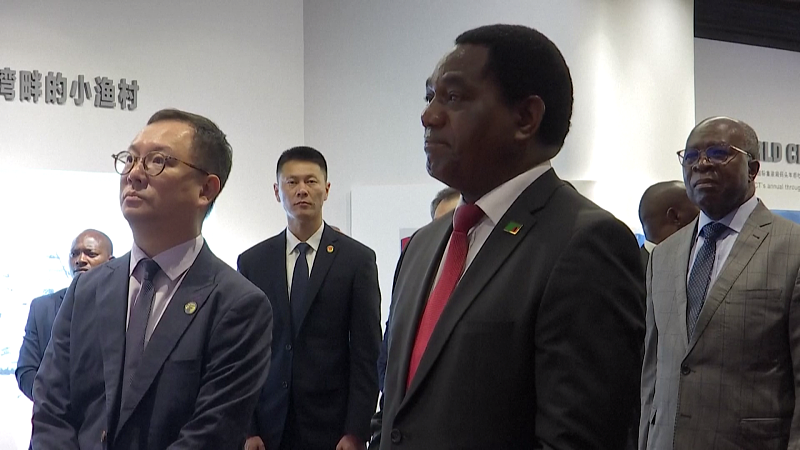
National flags of Zambia and China. /CFP
National flags of Zambia and China. /CFP
Editor's note: Farhad Chowdhury, a special commentator for CGTN, is a security and strategic affairs researcher and columnist. The article reflects the author's opinions and not necessarily the views of CGTN.
The President of Zambia, Hakainde Hichilema, is visiting China from September 10 to 16. This official visit may be considered as a significant move toward further strengthening the bilateral ties between Zambia and China.
Some significant events, such as Zambia's support for China's seat at the UN being restored in 1971, Zambia's adherence to the one-China principle, and China's construction and funding of the TAZARA railway as well as other BRI-related development projects, serve as symbols of this close connection.
However, the visit of Hichilema occurs at a critical juncture in the age of polarized international politics led by the U.S., as China attempts to advocate multilateralism in opposition to U.S.-led unilateral hegemony and changes in alliances have the potential to alter the balance of power and trade. During these adjustments, Zambia's outreach to China might have effects that transcend beyond their bilateral relations.
Zambia and China have fostered a developing partnership for many years. The commerce and infrastructure sectors of Zambia are among those where China has had a significant impact. As a result of these links, Zambia has prospered in several fields, making China one of Zambia's most important development partners.

President of the Republic of Zambia Hakainde Hichilema in Shenzhen, China, September 11, 2023. /CFP
President of the Republic of Zambia Hakainde Hichilema in Shenzhen, China, September 11, 2023. /CFP
The COVID-19 pandemic caused Zambia to become the first African country to default on its national debt in 2020. Zambia became a test case for a G20-initiated debt restructuring mechanism as a result of this circumstance. According to the deal in June, bilateral creditors of Zambia, including China, agreed to restructure the nation's payments over 20 years. In its place, longer debt payback terms and a three-year grace period have been implemented.
A positive step toward consolidating ties through mutual understanding in this regard is President Hichilema's trip to China. It represents the value of collaboration in debt management and economic recovery through mutual understanding. This visit can offer a path for Zambia's debt restructuring, which is essential for the country's economic recovery to achieve long-term financial stability, as seen by its cooperation with the Export-Import Bank of China and other bilateral creditors.
The visit highlights both the need for bilateral collaboration for long-term financial stability and China's major contribution to Zambia's economic revival.
According to Mao Ning, a spokesperson of the Chinese Foreign Ministry, "China will continue to maintain close communication and friendly consultation with Zambia and other parties concerned, to continue to play a constructive role in the resolution of Zambia's debt woes." China was the first official international creditor to implement debt relief actions for Zambia and subsequently facilitated three productive meetings as co-chair of Zambia's creditors committee. "We believe that Zambia's debt restructuring problem requires mutual understanding and trust among all stakeholders and a joint effort to find the best solution," said Mao.
Considering that international financial organizations and commercial creditors with a Western slant account for 70 percent of Zambia's external debt, Mao argued that these parties should undertake their obligations and move to lessen the weight of the nation's debt.
China has really provided tangible assistance to help African nations deal with their debt issues. China announced during the Forum on China-Africa Cooperation's eighth ministerial conference that it will grant $10 billion in Special Drawing Rights to Africa over many years. China has the most suspended debt service payments among G20 members, having struck agreements or achieved consensus with 19 African nations for debt relief.
President Hichilema's visit to China is important for South-South cooperation, not just for the two countries involved. While China aims for mutually beneficial cooperation, anti-China hawks must understand that China will never intervene in another nation's domestic affairs. They must abandon the colonial mindset that originated in the West.
(If you want to contribute and have specific expertise, please contact us at opinions@cgtn.com. Follow @thouse_opinions on Twitter to discover the latest commentaries in the CGTN Opinion Section.)